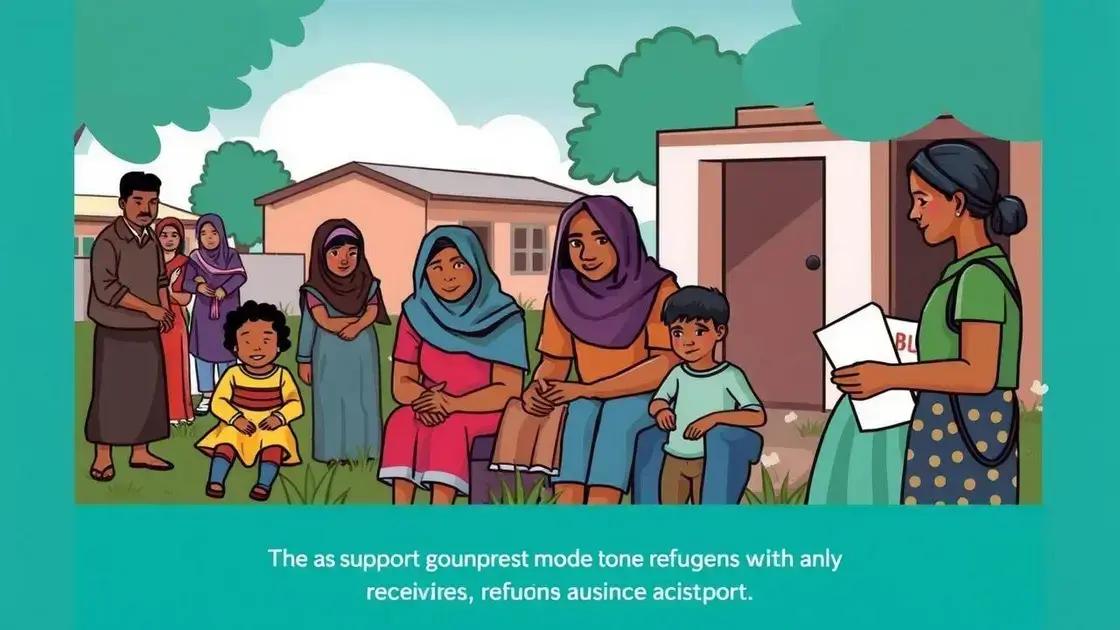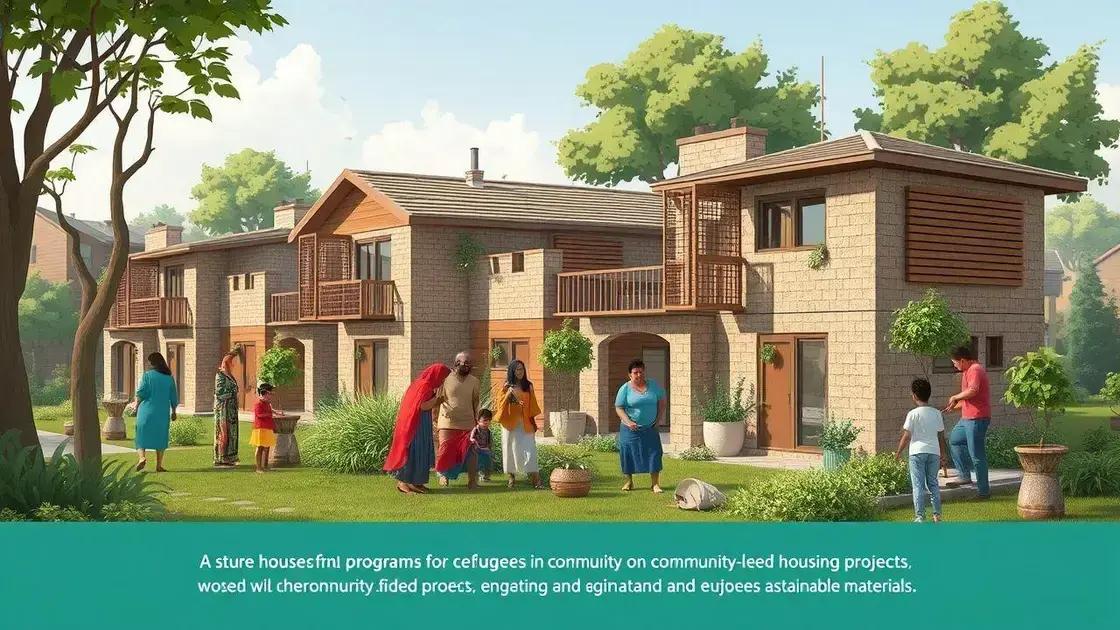Housing assistance for refugees increased: what you need to know

Housing assistance for refugees increased significantly supports their integration by providing stable housing, which enhances access to education, employment, and community ties.
Housing assistance for refugees increased in recent years, providing vital support to displaced families. But how does this expansion affect local communities? Let’s dive in and explore the implications.
Overview of increased housing assistance for refugees
The recent increase in housing assistance for refugees marks a significant step towards improving the lives of many displaced individuals and families. This initiative has brought much-needed support to those seeking a safe place to live. Many refugees face unique challenges, making this assistance crucial for their integration into new communities.
Key Features of Housing Assistance
Recent changes have expanded the scope of support available, enhancing both accessibility and effectiveness. Here are some key features of the expanded assistance:
- Financial support for rent, allowing families to secure stable housing.
- Access to legal services to help navigate housing laws.
- Programs designed to facilitate connections with local housing providers.
- Support for integration into the community, including language classes and job training.
As more countries recognize the need for such programs, the impact of housing assistance continues to grow. The focus is not only on providing shelter but also on ensuring that refugees receive the needed support to thrive. These efforts lead to stronger, more resilient communities where everyone has a place.
With the rise in funding, organizations are better equipped to address the diverse needs of refugees. This shift not only contributes to their well-being but also enriches the communities where they settle. The collective effort to enhance housing assistance demonstrates a commitment to humanity and dignity for those in need.
Challenges faced by refugees in securing housing

Many refugees encounter significant challenges in securing housing after fleeing their home countries. These obstacles can make it difficult for families to find a stable place to live. Understanding these challenges is crucial to improving support systems for refugees.
Common Challenges
Refugees often face various barriers that complicate their housing search. Some of these challenges include:
- Limited financial resources, making it hard to afford rent.
- Language barriers that hinder communication with landlords and housing agencies.
- Discrimination from landlords due to their refugee status.
- Lack of knowledge about local housing laws and available resources.
Another significant issue is the scarcity of affordable housing options in many regions. This shortage can lead to long waiting periods for suitable housing. Often, refugees must choose between substandard living conditions or overcrowding. Additionally, the process of securing housing is often complicated by bureaucratic red tape, which can delay assistance.
Moreover, the emotional toll of displacement can compound these challenges. Many refugees are coping with trauma from their past experiences, which can impact their ability to navigate housing processes. It’s vital for communities to understand these complexities in order to provide effective support to refugee families.
Efforts are being made to address these barriers, such as increasing funding for housing assistance programs and raising awareness about the unique needs of refugees. Collaboration between governments, local organizations, and community members can create opportunities for refugees to find safe and stable housing.
Impact of housing assistance on refugee integration
The impact of housing assistance on refugee integration is profound and multifaceted. When refugees secure stable housing, they often experience improved emotional and social well-being. This stability allows them to focus on rebuilding their lives in a new country.
Benefits of Stable Housing
Stable housing contributes directly to successful integration. Here are some key benefits:
- Access to education for children, leading to better future opportunities.
- Improved mental health, as families feel more secure and supported.
- Stronger community ties, helping refugees build relationships and find support networks.
- Increased chances of employment, as having a permanent address facilitates job applications.
Moreover, when refugees find appropriate housing, they often feel a greater sense of belonging. This connection to a community can ease feelings of isolation. As they engage with their neighbors and local organizations, refugees also contribute to the community by sharing their unique cultures and experiences.
Housing assistance programs not only help individuals but also foster diverse, vibrant neighborhoods. As refugees integrate, they bring new perspectives and skills, benefiting the local economy and enriching society as a whole. Communities that embrace refugees often see enhanced cultural exchanges, leading to more inclusive environments.
While challenges remain, the positive effects of housing assistance are clear. Policies that support refugee housing can transform lives and communities alike. Ensuring that refugees have access to affordable housing options is essential for promoting integration and harmony in society.
Future prospects for housing programs for refugees

The future prospects for housing programs for refugees look promising as governments and organizations increasingly recognize the importance of effective housing solutions. As global displacement continues to rise, it is vital to prioritize sustainable and scalable housing initiatives.
Innovative Approaches
Many organizations are exploring innovative approaches to meet the housing needs of refugees. Here are some notable trends that are emerging:
- Community-led housing solutions that empower refugees to take part in the planning and development process.
- Partnerships between non-profits and the private sector to create affordable housing projects.
- Utilizing technology to streamline housing applications and connect refugees with available resources.
- Creating integrated communities where refugees can live alongside local residents, fostering mutual understanding.
In addition to these trends, policymakers are increasingly focusing on long-term strategies. This involves integrating housing programs with education, health care, and employment assistance. By looking beyond mere shelter, these programs aim to support the holistic development of refugees.
Another exciting prospect is the use of sustainable building materials in housing construction. Emphasizing eco-friendly solutions aligns with global efforts toward sustainability while providing refugees with safer, more durable homes.
A collaborative approach among governments, humanitarian organizations, and community groups will be essential in advancing these initiatives. By sharing resources and knowledge, stakeholders can create more resilient systems that adapt to changing needs.
As we look to the future, the ability to provide timely and adequate housing will be crucial in addressing the needs of refugees worldwide. The combination of innovation and collaboration will not only improve the lives of refugees but also enrich communities as a whole.
FAQ – Frequently Asked Questions about Housing Assistance for Refugees
What is housing assistance for refugees?
Housing assistance for refugees provides support to individuals and families who have been displaced, helping them secure stable and affordable housing.
How does housing assistance benefit refugees?
It helps refugees integrate into their new communities, access education, and find employment, promoting overall stability and well-being.
What challenges do refugees face in securing housing?
Refugees may face financial constraints, language barriers, discrimination, and a lack of knowledge about local housing laws.
What is the future of housing programs for refugees?
Future programs are expected to focus on sustainable solutions, community involvement, and collaboration between governments and organizations to better meet the needs of refugees.





